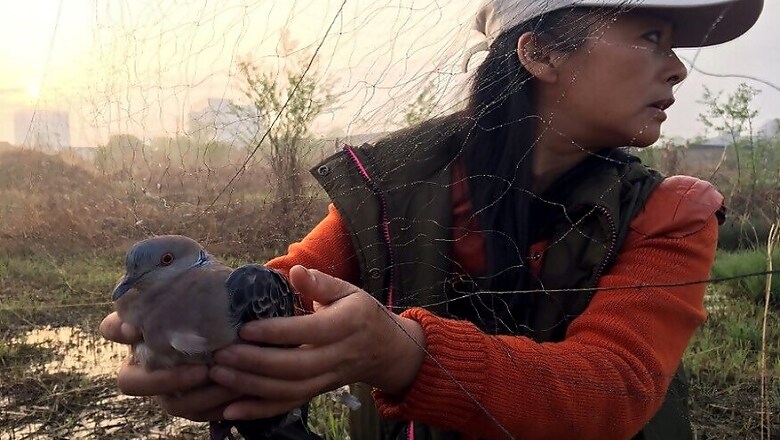
views
Poyang Lake, China: For much of the past year, Liu Yidan has patrolled the backroads of China in a black jeep, hunting for bird poachers.
The former restauranteur is part of a growing and increasingly proactive network of vigilantes in China who monitor the countryside and animal markets to combat wildlife poaching, which is endangering the existence of some species.
They hack down nets, track poachers with drone-mounted cameras, and chase traffickers.
Their efforts peak in spring and autumn, when poachers are out in force as more than 50 million migratory birds fly through China.
"It's impossible to cut them all down," Liu said.
"While birds can fly around the world, when they come to China they often reach their end," the 52-year-old told Reuters on the shores of Poyang Lake, China's largest freshwater lake, which is located in the southeast of the country. It attracts hundreds of thousands of migratory birds, including swans, geese and rare cranes.
Mist nets and packets of Carbofuran, a pesticide used to drug birds, were found by Reuters correspondents in what is a protected nature reserve.
The informal network attracts thousands of volunteers, reflecting growing public concern over environmental degradation and frustration at what they see as lax enforcement of environment laws - although China's State Forestry Administration, which oversees nature conservation, says it operates a zero tolerance policy.
Unlike many Chinese environmental non-government organisations (NGOs) that have tended to focus on local issues, Liu is part of a coalition of some 40 groups around the country aiming to conserve bird and wildlife, especially from poachers.
Despite tighter controls over civil society in China under President Xi Jinping, some analysts say authorities are allowing green groups like Liu's a relatively wide berth, part of what analysts call "collaborative governance" in areas of the country allowing NGOs room to address non-political issues.
China's voracious demand for ivory, horns, bones, fins and scales is well documented alongside the impact that appetite has on animals like the African black rhinoceros, Sumatran tiger and Chinese pangolin.
Less known is how millions of birds are caught by poachers in China each year.
The world's fourth-biggest country is a major transit point for birds flying thousands of kilometres on the East Asia/Australasia Flyway from summer breeding grounds in the Northern Hemisphere to wintering areas in the south.
"This is a real bottleneck because on the migration routes... most of these birds have to passChina," said Johannes Kamp, a biologist from Germany's University of Munster who has studied the impact of hunting on birds in China.
Based on figures collated by thousands of activists, poachers trap an estimated 7-10 million wild birds each year. An exact figure is difficult to ascertain and there is little public information on the prosecution of bird poachers to derive a clearer picture.
"The scale sounds right to me, but I have to say it's very difficult to give a credible estimate," said Kamp. "My gut feeling is, it's in the tens of millions at least in China".
Offenders can face stiff fines, more than 10 years in jail and have property confiscated. But there is little official public information on how the policy is working and enforced.
A review by Reuters of the administration's WeChat social media posts since September 2017, however, found 36 specific mentions of bird poaching cases, with 84 people arrested and 123,000 birds seized in 13 provinces across China.
HIGH-SPEED CHASES
Li, a 42-year-old teacher, leads a group of activists in southern China and has been involved in high-speed car chases, beaten by thugs and posed as a buyer to smoke out illegal traders.
"Once, a man came after me with a cleaver," Li, who declined to give his full name out of fear for his safety, told Reuters during an all-night patrol. "It's risky but if we don't do anything, things would be a lot worse."
Li's van is loaded with surveillance kit, including a drone equipped with a digital camera and zoom lens. He said 20 volunteers in his group gather intelligence on suspect deliveries by lorry, plane and train, and pass the information to police. The group's work has led to numerous arrests, sometimes after high speed car chases, he said.
As he drove, Li's smartphone beeped frequently with messages from other activists giving vehicle license plate numbers and GPS coordinates of lorries carrying suspicious cargoes.
Some group members have been arrested or warned not to continue their activist work because it could embarrass local authorities, Li said.
"Our interests are the same as the (Communist) party, to protect nature, to have a more beautifulChina," Li said.
MARKET PLACE
Activists say the birds are sold through markets and breeding farms alongside legally raised animals, such as in the affluent southern province of Guangdong.
Li said activists estimate 20,000 birds are brought, on average, into Guangdong daily, adding up to more than 7 million annually.
In one case last October, Li's team helped to uncover 18,000 birds in 16 styrofoam boxes, including 2,000 yellow-breasted buntings. They had been transported on a cargo flight to Shenzhen airport in Guangdong. Two men were subsequently jailed.
Huang Chunjiang, a government official overseeing the Ruineng market, one of the biggest in Guangdong, said traders were permitted to sell hundreds of thousands of farm-reared birds and animals annually. But he said it is difficult to verify that all the animals had been raised domestically.
"We must redouble efforts, there's no other way," the State Forestry Administration official told Reuters by telephone.
"The situation is worsening ... It is a headache for the government because in the market they will sell legal things, but behind the scenes, whether they do other things, no one can say for sure".
NEXT PASSENGER PIGEON?
The finch-like yellow-breasted bunting has been extensively hunted in China as a culinary delicacy. Once found in the millions from Japan to Scandinavia, experts say it could face extinction like the passenger pigeon of North America, once one of the world's most abundant species.
Last year, the bunting was reclassified as critically endangered, a category short of extinction in the wild, by the International Union for Conservation of Nature (IUCN), a global authority made up of governments and NGOs.
Other birds affected by poaching in China include the chestnut, rustic and little buntings, say experts. The endangered spoon-billed sandpiper and Nordmann's greenshank are not targeted for food but are vulnerable to bird nets.
Activists say the challenge is daunting but they are encouraged by more green volunteers coming forward to beef up the anti-poaching network.
One newcomer, 26-year-old Yue Hua from Ganzhou in southern China, gave up a pharmaceutical career to become a fulltime activist.
"After witnessing the environment of my hometown worsen due to mining, I wanted to do something," he said. "I hope man and nature can co-exist harmoniously. That's my dream."



















Comments
0 comment